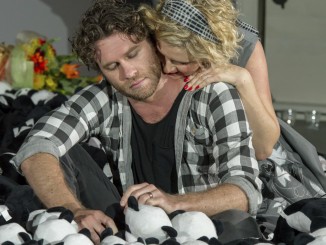
[A Fine Partnership]
A Fine Balance is a wonderful collaboration between the Auckland Theatre Company and Prayas Theatre that successfully stages diverse stories and bodies that are not heard or seen often enough on Auckland’s mainstages. With Q Rangatira configured as theatre in the round, with seating banks on four sides, the performance begins with a woman bent low, sweeping the floor of the stage with the traditional humble Indian broom or ‘Jhadu’. Soon the stage is filled with people (the cast numbers 18), all standing or going about their daily routine, but with their eyes fixed their newspapers as they follow the unfolding political events.
Set in 1975 and based on Rohinton Mistry’s celebrated Man Booker shortlisted novel, A Fine Balance explores the consequences of Prime Minister Indira Gandhi’s declared ‘state of emergency’: the government’s ‘beautification programme’ which involved a series of oppressive policies targeting the homeless and the poor. The play attempts to distil the larger politics and policies of the time and trace their impact on the personal lives of everyday Indian people. It moves beyond the pressing newspaper headlines, exploring the lives of ordinary people caught up in the struggle between oppressive traditions and alienating neoliberal modernity. This struggle is epitomised by the story of Dina, a Parsi widow determined to maintain independence from her capitalist brother, who hires two Hindu tailors and takes on a boarder to make ends meet. Played with heart and a quiet strength by Rashimi Pilapitiya, Dina struggles to meet the ruthlessness expectations of a demanding and successful boss while remaining sympathetic to the employers she hires. Dina’s hired tailors, the younger restless nephew Om (Mel Odedra) and the cautious uncle Ishvar, played with dignity in an outstanding performance by Mustaq Missouri, have worked hard to escape the oppressive caste system by being apprenticed to a Muslim family of tailors. Uncle Ishavar is compelled to find his Nephew a wife, much to Om’s resentment, and so fulfil a duty to ensure the continuation of the family line. Ultimately the play shows that for some, the struggle to escape oppressive traditions is fraught with failure and this reveals a fatalism in the plot that ultimately situates this as a tragedy.
Directed beautifully by Ahi Karunaharan, this production (which Prayas originated at TAPAC in 2015) is bursting at the seams with colour and vibrancy. Micheal McCabe’s set design is a highlight, using the eloquent simplicity of a few props to transform the space. Two old Singer sewing machines on casters are wheeled on and off stage to create the workspace of Dina’s apartment, a clothes line hanging with sheets is strung between bamboo poles fixed to jerrycans to create a slum, and plastic corrugated sheets and a bed frame help to conjure a doctor’s surgery. The simplicity of the set is made effective by the excellent physical skills of the cast (supported with movement direction by Tupua Tigafua), who populate and inhabit the stage and bring life to the production. This includes the use of two puppets, a dog and a monkey created by puppet maker Paul Lewis.
With so much theatricality it was curious for me to reflect on why I felt emotionally disengaged from the characters by the end of the play. There is something epic about the play – its scope demands a kind of distance from audiences to appreciate how power and politics are constructed and deployed. In the end I thought about the characters more than I felt for them – but perhaps in this era of fake news and bipartisan politics of heightened passions, perhaps we need more theatre that gets us thinking.
Above all, this production stands as a testament to a strong and meaningful collaboration between Auckland Theatre Company and Prayas – a South Asian community theatre company. It was not long ago that emerging playwrights were being advised not to write plays with too many characters as the costs of producing productions with large casts would be too prohibitive. There is also the perception that economic imperatives have led to vanilla productions catering mainly to privileged white audiences. Credit should go to Lynne Cardy, Associate Director at Auckland Theatre Company, who according to the programme conceived of this collaboration. This co-production hopefully signals an exciting shift in the creative direction of the ATC as it partners with other creative voices of Auckland’s community to bring a wider range of stories to the stage and develop audiences so that the company can truly deserve the title of being Auckland’s flagship theatre company.
A Fine Balance. Adapted by Sudha Bhuchar and Kristine Landon-Smith. Directed by Ahi Karunaharan. A Co-production by Auckland Theatre Company and Prayas Theatre. Q Theatre, 14 June – 6 July, 2019.




Leave a Reply